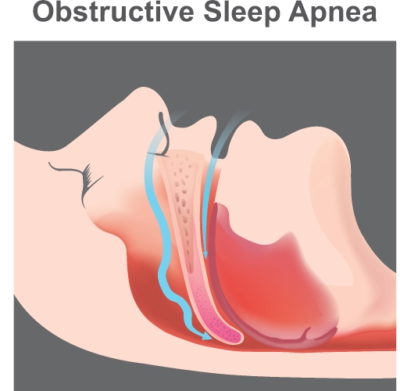WHAT IS SLEEP APNEA?
Sleep apnea is a condition where there is frequent interruption or cessation of breathing during sleep. Do you snore loudly, frequently wake up during sleep, or wake up tired in the morning? You may be suffering from sleep apnea! According to the Sleep Apnea Association, more than 22 million Americans are suffering from sleep apnea. The good news is that this problem can be easily treatable. Here’s everything you need to know about sleep apnea.
 THE DIFFERENT TYPES
THE DIFFERENT TYPES
There are three main types of sleep apnea. Obstructive apnea is the most common form of sleep apnea. It occurs when the throat muscles relax and obstruct the airway, leading to difficulty in breathing during sleep. Central apnea occurs when the brain sends erratic signals to the sensory and effector muscles. This leads to intermittent cessation in a breath. Finally, complex apnea, also known as treatment-emergent central sleep apnea, occurs when someone is suffering a combination of obstructive and central apnea.
HOW DO I KNOW IF I HAVE SLEEP APNEA?
The signs and symptoms of different forms of apnea tend to overlap, which may often create difficulty during diagnosis and treatment planning. However, some of the common signs and symptoms of sleep apnea include:
- Snoring – the snoring is often so loud that it can disturb the sleep of the loved ones.
- Frequent Cycles of Waking up – affected individuals often wake up during sleep, and gasp for air, as a result of cessation in breathing.
- Dry Mouth – this most commonly happens when someone has obstructive apnea. This is because individuals have to sleep with their mouths open. This results in dryness of the mouth.
- Drowsiness – since individuals do not get enough sleep, they feel tired or drowsy throughout the day.
- Irritability and Difficulty in Focusing – this happens when individuals are unable to get enough sleep.
TREATMENT OPTIONS
Management of sleep apnea involves treatment of the underlying cause. First, your dentist or physician immediately will perform a thorough clinical examination to diagnose the underlying cause, and to provide treatment. Modern dentistry and sleep medicine nowadays offer very precise and accurate methods for diagnosing different types of sleep apnea including home sleep tests and nocturnal polysomnography.
Positive airway pressure devices are machines which consist of different types of breathing masks. The Device supplies pressurized airflow, which effectively prevents the closure of the airways leading to sleep apnea. These devices are also helpful in getting rid of snoring.Oral appliances can also be used for treating sleep apnea. These appliances are worn in the mouth when you sleep, and they tend to position the lower jaw in a forward position so as to keep the airway patent.
For patients who have a non-dental cause of sleep apnea, your dentist may refer you to a physician or an ear, nose, and throat (ENT) specialist for the medical or surgical treatment. In some cases, surgery may also need to be performed for removing the soft tissues which cause obstruction of the airway during sleep. In addition, stimulation of nerves which send erratic signals to the effector organs may also be performed to treat central or complex sleep apnea.
LIFESTYLE CHANGES AND MANAGEMENT
Even very slight modifications in your lifestyle can have a huge impact on your oral and physical health and are also helpful in reducing symptoms associated with sleep apnea. The most effective lifestyle change is to reduce weight. It has been estimated that about 70% of people suffering from sleep apnea are obese and have excess weight. In addition, reducing your alcohol intake and tobacco use will also go a long way in reducing the symptoms and complications associated with sleep apnea. Finally, you should keep yourself fit and active through regular exercise and activity.
All of us need quality sleep to remain fit, and to perform daily life activities. Unfortunately, sleep apnea is the worst enemy of your sleep and quality of life. Therefore, if you feel that you are suffering from sleep apnea, you should seek expert help immediately. Failure to seek treatment time can lead to serious, even life-threatening complications.



